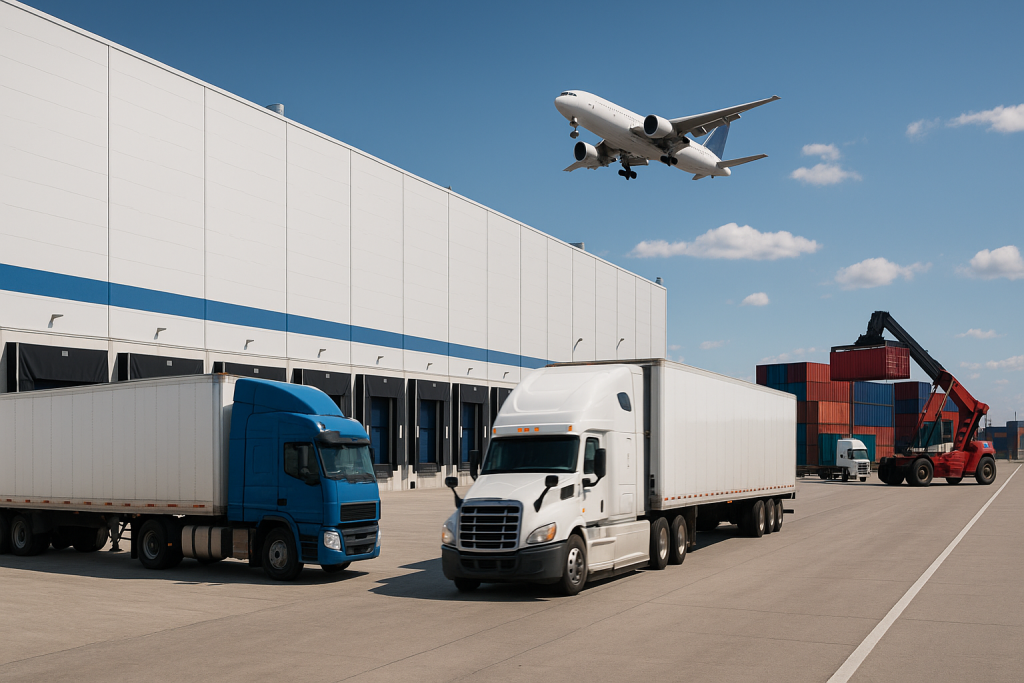By Martin Vassilev / 24 Sep, 2025
In the evolving global economy, logistics hubs have emerged as strategic anchors for international and domestic trade. Calgary, Alberta, and Dallas, Texas, stand out as rising powerhouses in North America’s logistics landscape. Their geographical positioning, infrastructure investment, and integration with trade corridors are transforming them into indispensable gateways for companies aiming to optimize supply chains and reduce delivery times. This article explores why Calgary and Dallas are becoming central to modern logistics, and how businesses can leverage these regions for long-term competitiveness.
Calgary benefits from its proximity to the Canadian Pacific (CPKC) and Canadian National (CN) rail systems, which connect the city to key ports such as Vancouver and Prince Rupert. This positions Calgary as a critical inland hub for containerized cargo moving between Asia and North America. Businesses operating in Calgary gain access to:
Efficient cross-border shipping into the U.S. Midwest.
A strong energy sector base that drives demand for industrial logistics.
Rapidly growing warehousing and fulfillment capabilities to serve both domestic and international markets.
With major investments in warehousing automation, companies can streamline operations by following best practices in maximizing warehouse efficiency.
Dallas, located at the intersection of major interstate highways (I-35, I-20, I-30, and I-45), connects the Gulf Coast, Midwest, and Mexico. Its central positioning makes it a national distribution hub for retailers, manufacturers, and e-commerce companies. Dallas’s strengths include:
DFW International Airport, one of the largest cargo airports in North America.
Strong connections to Houston’s port network, a vital trade link with global markets.
Expanding warehousing and fulfillment centers catering to booming e-commerce demand.
Both Calgary International Airport (YYC) and Dallas-Fort Worth International Airport (DFW) are investing heavily in cargo infrastructure. YYC is Canada’s only airport with dedicated 24/7 cargo services, while DFW is expanding cold chain capabilities for pharmaceuticals and perishable goods. This allows companies in sectors such as biotech, agriculture, and e-commerce to benefit from faster, more reliable supply chains.
Calgary and Dallas are aligning with global trends in warehouse innovation. Automation, robotics, and AI-driven systems are reducing operational costs and improving speed. Businesses can gain insight from resources like the future of warehouse automation, which explores how AI is reshaping logistics efficiency.
The USMCA, replacing NAFTA, reinforces the importance of North American trade corridors. Calgary benefits as a Canadian entry point, while Dallas serves as a U.S. gateway to Mexico. Together, these hubs strengthen trilateral trade by:
Facilitating faster cross-border freight.
Supporting manufacturing supply chains in automotive, energy, and agriculture.
Reducing tariffs and streamlining regulatory procedures.
For businesses navigating complex trade rules, the U.S. Customs and Border Protection (CBP) provides updated trade regulations that directly impact logistics operations.

The exponential growth of online retail has accelerated demand for logistics hubs with next-day and same-day fulfillment capabilities. Calgary and Dallas are uniquely positioned to serve this market due to:
Their centralized locations within Canada and the U.S.
Access to advanced fulfillment solutions such as fast e-commerce fulfillment.
Strong last-mile delivery networks, critical for ensuring customer satisfaction.
E-commerce brands seeking growth increasingly outsource warehousing and fulfillment to 3PL providers in these regions, aligning with global best practices.
Calgary’s economy is deeply tied to oil, gas, and clean energy technologies. The region’s warehousing and transportation networks are optimized to handle bulk cargo and specialized freight, making it a natural logistics hub for energy-related industries. Businesses can also benefit from insights into bulk cargo shipping.
Dallas serves as a key hub for automotive, aerospace, and electronics supply chains. With Mexico’s growing role as a nearshoring destination for U.S. companies, Dallas is set to benefit from increased trade volume moving through the NAFTA Superhighway (I-35 corridor).
Both Calgary and Dallas are investing in sustainable logistics practices to reduce environmental impact. Calgary leverages Alberta’s renewable energy expansion, while Dallas logistics companies are adopting electric vehicle fleets and renewable-powered warehouses. Businesses can explore how green logistics can reduce costs while meeting environmental standards.
Geographic Advantage: Access to ports, airports, and rail networks.
Infrastructure Investment: Smart warehousing and cargo airport expansion.
Trade Agreements: USMCA boosts North American supply chains.
E-Commerce Fulfillment: Positioned for same-day and next-day delivery.
Sector Diversity: Energy, manufacturing, and technology drive growth.
Sustainability Focus: Commitment to eco-friendly logistics.
Companies evaluating logistics strategies can benefit from resources such as the ultimate guide to efficient warehousing to strengthen their decision-making.
Calgary and Dallas are no longer secondary players in North American logistics—they are strategic anchors shaping the future of trade. By combining infrastructure, policy support, e-commerce growth, and sustainable practices, Alberta and Texas are cementing their roles as indispensable logistics hubs. Businesses that align with these regions can access faster, cost-effective, and globally connected supply chains.
To explore customized logistics solutions for your business in Calgary, Dallas, and beyond, connect with ByExpress Logistics.

“Thanks to Byexpress all my shipping and fulfillment costs are in line now”

“All my issues were solved by Byexpress team that I had with pervious 3pl provider.”

“Thank you Byexpress team could not done it without you guys.”

“Their integration and customer service were the key for me”

“Outstanding delivery service! The package was well-packaged, and
the delivery team was professional and courteous”

“Great and knowledgeable team to work with.”

Thanks, guys, for reducing my shipping rates
Ottawa Office
2411 Holly Lane
Ottawa, ON, K1V 7P2
Toronto Office
13-280 West Beaver Creek Road Unit #136
Richmond Hill, ON, L4B 3Z1
Alexandria Office
173 Kenyon Street West
Alexandria, ON, K0C 1A0
Montreal Office
4388 Saint-Denis Street Unit #200
Montreal, QC, H2J 2L1
California Office
155 North Riverview Drive
Anaheim Hills, CA, 92808
Call Us
Toll-Free: 1-866-744-7122
Local : 613-739-3000
Email Us
Multilingual Services










